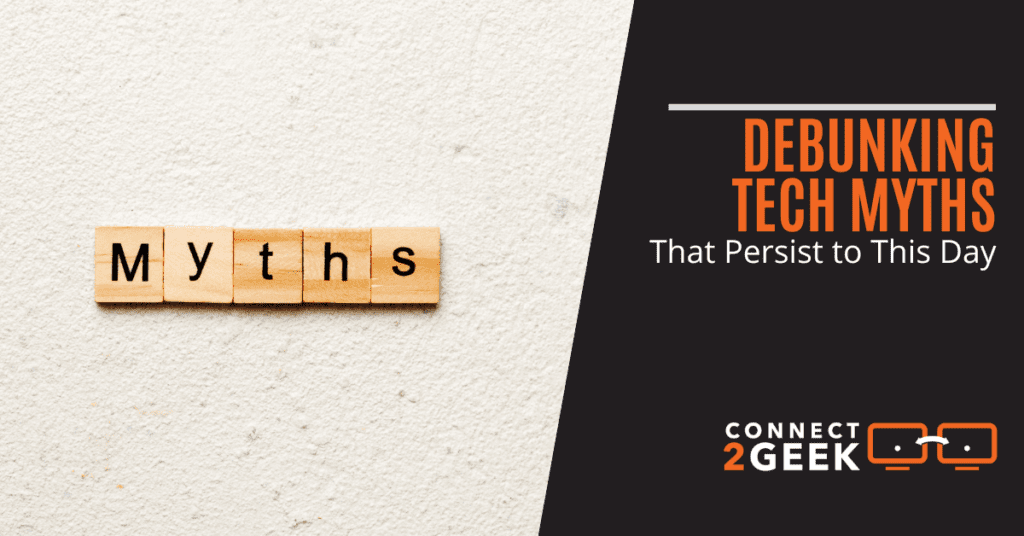
In the vast realm of technology, myth and misconceptions capture our imagination, perpetuate fear, and distort our understanding. Despite living in an era of breathtaking technological advancements, these persistent falsehoods and misinformation influence our beliefs and actions.
According to a CBS News report, 95% of Americans recognize misinformation as a significant problem. This issue extends beyond general knowledge and spills into technology, where countless individuals are misled by at least one prevalent tech myth.
It’s time to go through the digital outlook and unveil the truth behind these pervasive misconceptions and liberate ourselves from their grip
This article will debunk the myths that have plagued our technological lives for far too long. From smartphones and laptops to privacy concerns and viral online rumors, it will illuminate the hidden realities and reveal the secrets beneath the surface. Read on to gain the knowledge and guidance to navigate the digital world confidently and clearly.
Common Tech Myths That Persist
Here are some common tech myths to know so you or your business won’t fall prey to tech disinformation. These myths will help you and your business prepare for the unexpected. Let’s delve into their truths.
Myth 1: You’re Too Small to Be Targeted by Cybercriminals
It is a common myth that individuals or small businesses are not attractive targets for cybercriminals.
Cybercriminals often employ automated tools that indiscriminately target any vulnerable system, regardless of size. Neglecting cybersecurity measures can make individual and small businesses susceptible to cyberattacks, underscoring the importance of maintaining robust security practices.
Myth 2: Incognito Mode Makes You Completely Anonymous Online
One prevailing myth is that using the private browsing feature, such as Chrome’s Incognito mode, ensures complete anonymity while browsing the internet.
This is not entirely true. The incognito mode may prevent your browsing history from being stored on your device. Still, it does not conceal your online activities from your Internet service provider (ISP), websites you visit, or potential hackers.
It primarily focuses on local privacy by not retaining local browsing history and cookies, but it doesn’t provide complete anonymity or protect your online identity from external sources. Security and protection measures like a virtual private network (VPN) are recommended for enhanced online anonymity.
Myth 3: Mac Computers and iPhones are Immune to Viruses and Malware
There is a persistent belief that Mac computers and iPhones are impervious to viruses and malware, unlike their Windows and Android counterparts.
This is not entirely accurate. While macOS and iOS have historically experienced fewer malware attacks, they are not immune to security threats. As their popularity increases, cybercriminals have begun developing more sophisticated malware targeting Mac and iOS devices.
Installing reputable antivirus software and practicing safe browsing habits are crucial to mitigate the risk of malware infections on these platforms.
Myth 4: Private Wi-Fi Networks are Completely Secure
Many assume that connecting to a private Wi-Fi network, such as their home network, ensures complete security.
This is a misconception. Private Wi-Fi networks may offer security through encryption protocols but are not immune to vulnerabilities. Hackers can still exploit weak passwords, outdated firmware, or encryption flaws. Additionally, unauthorized users within the network’s range may attempt to gain access.
Protecting private Wi-Fi networks and sensitive data from threats is essential by incorporating proper security measures, such as strong passwords and encryption.
Myth 5: Overcharging Your Laptop Damages the Battery
There is a common misconception that leaving your laptop plugged in after it reaches full charge will harm the battery.
This is not true for modern laptops. The laptop’s built-in battery management system intelligently manages the charging process. The system automatically stops charging or switches to a trickle charge immediately after the battery reaches its maximum capacity, providing some power to maintain its charge level.
You can leave your laptop unplugged and worry less about any damage to the battery.
Myth 6: Artificial Intelligence Possesses Consciousness and Self-Awareness
That artificial intelligence (AI) possesses human-like consciousness and self-awareness is another myth that must be debunked.
This is far from reality. AI systems are designed to mimic human cognitive processes and perform specific tasks through algorithms and data analysis. While AI can exhibit impressive speech recognition and decision-making capabilities, it lacks true consciousness.
AI lacks subjective experience, emotions, and self-awareness inherent to human consciousness. AI is a tool humans create and operates based on programmed instructions without genuine consciousness or awareness of its existence.
Myth 7: Alexa is Constantly Capturing and Storing All Audio Data
There is a prevailing myth that smart voice assistants like Alexa continuously record and store all audio data in a constant surveillance-like manner.
However, this is not true. Smart speakers like Alexa only start recording and transmitting audio to the cloud when activated by specific wake words, such as “Alexa” or “Hey, Google,” ensuring that audio data is not constantly recorded without user activation.
Myth 8: The Presence of 5G Towers Can Cause Negative Health Effects
There is a persistent myth that the electromagnetic radiation emitted by 5G towers can have harmful health effects on humans.
However, extensive scientific research and regulatory bodies have repeatedly confirmed that the radiofrequency radiation emitted by 5G networks is well within safe limits and poses no significant health risks. The concerns surrounding 5G tower radiation are not supported by scientific evidence.
Partner with Connect2Geek to Stay Well Informed
Staying well-informed and separating fact from fiction is crucial in a rapidly evolving tech landscape. Partnering with Connect2Geek ensures access to reliable tech expertise and guidance, ensuring you confidently navigate the ever-changing world of technology and make informed decisions for your digital needs.
Stay ahead of the curve and connect with Connect2Geek today!
